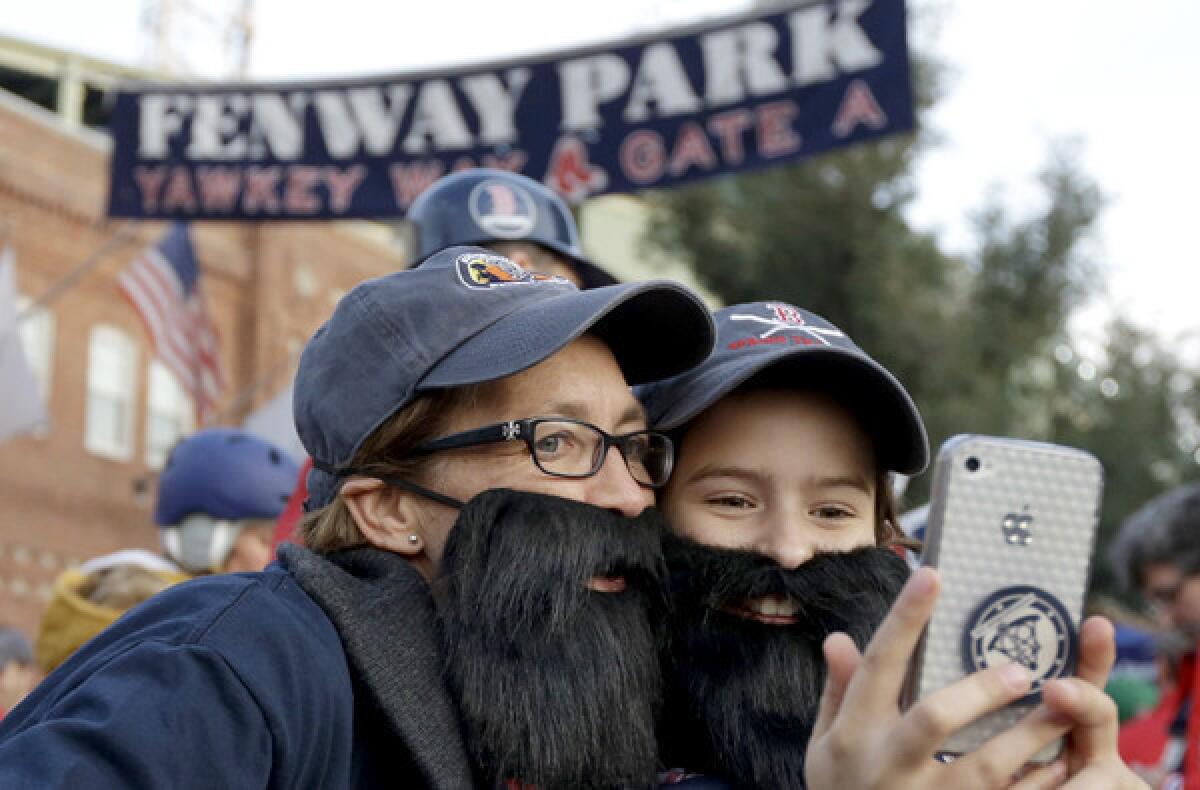Want public money for sports venue? Point to Red Sox fever in Boston

- Share via
BOSTON -- The consensus among economists is not one that America’s professional sports leagues like to hear. The taxpayers get no significant financial return from paying to build a ballpark or a football stadium or a sports arena.
The lesson has been learned in California. The San Francisco Giants paid for their new ballpark. The Dodgers paid to renovate theirs. The Oakland Athletics would love to pay for one in San Jose, but the commissioner, the Giants and the courts stand in their way.
If the argument is that public funding for sports facilities makes no sense, the opposing argument could be heard, seen and felt all around Fenway Park on Wednesday. There are few things that can unify a city like a professional sports team.
It could be a little thing, like the doughnut shop outside the Kenmore Square subway stop offering a two-for-one special to anyone wearing a Boston Red Sox jersey.
It could be a big thing, like people paying $1,000 for a ticket to stand during Game 6 or $10,000 for one of the best seats in the house. The secondary ticket market has never been more robust for a baseball game.
The Red Sox have not clinched the World Series at Fenway Park since 1918, when their roster included a left-handed pitcher named Babe Ruth.
To be in the house when that happens would be, as the commercial says, priceless.
“There’s a lot of people with a lot of money willing to spend,” Red Sox Manager John Farrell said.
“From a historic perspective, you consider that an event like this hasn’t been here in a couple of generations. There’s a lot of people that are willing to take some extra cash and try to be a part of it.”
The Red Sox are everywhere here, their signature B all over the television and radio, and on the cap of just about anybody in town wearing one.
Of all the television sets in Boston, four of every 10 were tuned into Game 5 of the World Series. At the height of Game 4, the one that ended with the walk-off pickoff, seven of every 10 sets in Boston were tuned to the World Series.
Farrell stopped for his same old cup of coffee on his way to Fenway Park on Wednesday, trying to maintain his regular routine. The city around him, well, there was nothing regular or routine about this particularly intense strain of Red Sox fever.
“If we weren’t aware of what is going on, we’re probably under a rock,” Farrell said. “When you turn the TV on or whether you listen to a radio station on the way in, yeah, there’s reminders all around us.”
When Boston won the World Series in 2004, that was supposed to be the blessed end of references to the Red Sox not winning a title since 1918.
No, as it turns out, and as the scalpers would be happy to tell you. The reference now is to the Red Sox not winning at home since 1918, and it’s the talk of Boston.
“We all understand the magnitude,” outfielder Shane Victorino said. “I don’t think there’s even that many people who could say they remember that or even could say that they were around when that happened.”
Probably not, considering you would have to be 95 now to have been around then, and pushing 100 to have some memory of it.
“We don’t take for granted the passion that our fan base have or that our fans have,” Farrell said. “And I think our guys get it. They understand their place here. And they understand that what the Red Sox mean to this region, particularly this city.”
That is a return that you cannot measure in dollars and cents. It makes no economic sense for taxpayers to build a ballpark for billionaire owners and millionaire athletes. However, if your mayor or governor is pitching public funding, he might want to import some passionate Bostonians.
Twitter: @BillShaikin
More to Read
Go beyond the scoreboard
Get the latest on L.A.'s teams in the daily Sports Report newsletter.
You may occasionally receive promotional content from the Los Angeles Times.











